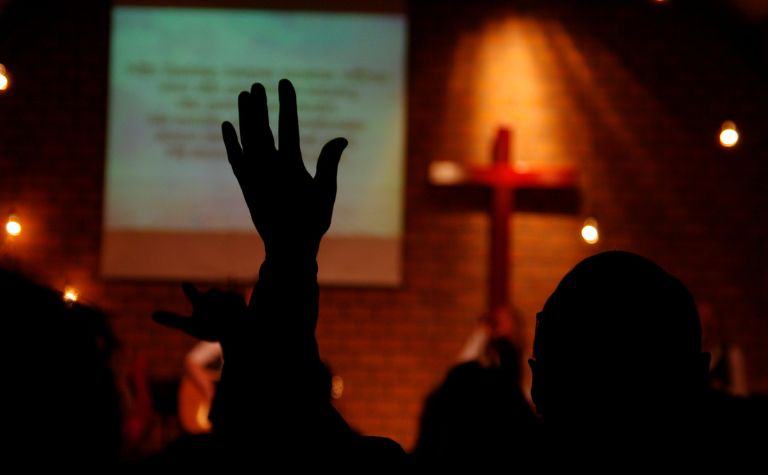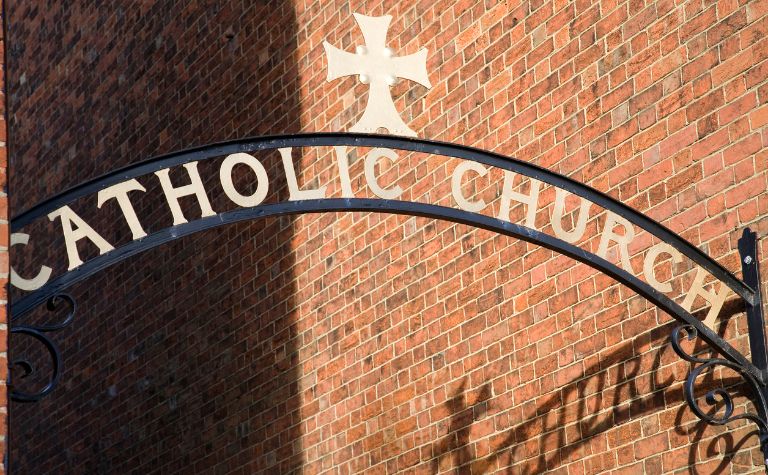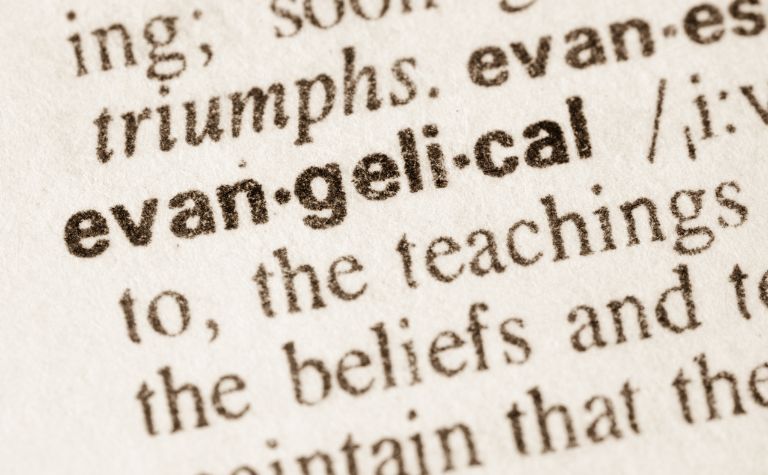Roman Catholicism and evangelicalism, two prominent branches of historic Christianity, have shaped the spiritual landscape for centuries.
While both traditions uphold the centrality of Jesus Christ, their histories, practices, and beliefs present distinct nuances.
This article compares these two Christian traditions, highlighting their similarities and differences to provide a clearer understanding of their respective identities.

Roman Catholic and Evangelical Churches: Differences
“Roman Catholicism” combines “Roman” (referring to the church’s central location in Rome) with “Catholic,” from the Greek “katholikos,” meaning “universal.”
“Evangelical” derives from the Greek “euangelion,” translating to “good news” or “gospel,” emphasizing the tradition’s focus on the gospel message and personal conversion.
| Catholicism | Evangelicalism | |
|---|---|---|
| Name | Roman Catholicism | Evangelicalism |
| Size | Approx. 1.3 billion worldwide | Approx. 300-400 million worldwide |
| Date Started | 1st century AD | Historically rooted in the Reformation, but the modern movement began in the 18th century |
| Founder | Jesus Christ (as believed by the Church) | Varied; key figures include John Wesley, George Whitefield, Jonathan Edwards |
| Key Beliefs | Seven Sacraments, Papal Authority, tradition and Scripture | Authority of Scripture, personal conversion experience, centrality of Christ’s atonement |
| Key Practices | Mass, confession, praying the Rosary | Bible study, personal evangelism, worship services |
| Divisions | Various rites (e.g., Roman, Byzantine) but unified under the Pope | Numerous denominations and independent churches |
| Central Location | Vatican City | No central location; widespread globally |
| Sacred Texts | Bible (including the Deuterocanonical books) | Bible (typically Protestant canon) |
What is the Authority of Scripture in evangelicalism?
In evangelicalism, the Bible is considered the inerrant word of God.
It’s the ultimate authority for faith and practice, guiding believers in doctrine and life.
Evangelicals emphasize personal Bible study and its central role in understanding God’s will and purpose.
What are the seven sacraments in Catholicism?
In Catholicism, a “sacrament” is a visible sign instituted by Christ to convey invisible grace to the recipient.
It’s a means through which believers receive God’s grace and are drawn closer to Him.
There are seven sacraments, each serving different stages and moments in a Catholic’s life.
| Sacrament | Description |
|---|---|
| Baptism | Initiation into the Church; removal of original sin. |
| Confirmation | Strengthening of baptismal grace; sealing with the Holy Spirit. |
| Eucharist | Receiving the body and blood of Christ; central act of worship. |
| Reconciliation | Confession and forgiveness of sins. |
| Anointing of the Sick | Healing and comfort for the ill or dying. |
| Holy Orders | Ordination of priests, bishops, and deacons. |
| Matrimony | Union of a man and woman in a lifelong covenant. |

Evangelical and Roman Catholic Beliefs
Catholicism and evangelicalism affirm the Trinity: one God in three persons – Father, Son, and Holy Spirit. They believe these three are distinct yet coexist eternally and harmoniously.
| Catholicism | Evangelicalism | |
|---|---|---|
| The Bible | Sacred Scripture, interpreted within Church tradition | Inerrant word of God; ultimate authority for faith and practice |
| God | One God, omnipotent and omniscient | One God, omnipotent and omniscient |
| Jesus Christ | Fully God and fully man; Savior of humanity | Fully God and fully man; personal Savior |
| The Trinity | One God in three persons: Father, Son, Holy Spirit | One God in three persons: Father, Son, Holy Spirit |
| The Holy Spirit | Active in the Church, guiding and sanctifying | Active in believers, guiding, convicting, and empowering |
| The Atonement | Christ’s sacrifice provides salvation, applied through sacraments | Christ’s sacrifice is the sole means of salvation; received by faith |
| The Resurrection | Literal and bodily resurrection of Jesus; believers will also be resurrected | Literal and bodily resurrection of Jesus; believers will also be resurrected |
| The Church | Mystical Body of Christ; hierarchical structure | Body of Christ; local congregations with varied governance |
| Church Tradition | Equal importance with Scripture; shapes interpretation | Generally secondary to Scripture; varies by denomination |
| The Second Coming | Jesus will return to judge living and dead; details less emphasized | Jesus will return imminently; varies in details among denominations |
In Catholic theology, both Scripture and Tradition are vital sources of revelation.
They’re intertwined with Tradition, preserving and interpreting the teachings of Scripture.
Together, they comprehensively understand God’s word and the Church’s teachings, ensuring continuity and consistency in faith and practice.

Important Practices in Catholicism and Evangelicalism
| Catholicism | Evangelicalism | |
|---|---|---|
| Worship Services | Mass, centered on the Eucharist | Worship services focused on Bible teaching and communal singing |
| Sacraments/Ordinances | Seven sacraments, including Eucharist and Confession | Typically two ordinances: Baptism and Communion |
| Prayer | Structured prayers (e.g., Rosary), personal prayers | Personal and communal prayers, often extemporaneous |
| Bible Study | Scripture readings within Mass; personal study encouraged | Central to worship; personal and group studies common |
| Evangelism | Missionary work; catechesis for new believers | Active outreach; emphasis on personal conversion |
| Fasting | Obligatory during Lent and on specific days | Varies; some emphasize fasting as personal spiritual discipline |
| Church Governance | Hierarchical: Pope, bishops, priests | Varies; often congregational or led by elders/pastors |
| Veneration | Saints and Mary venerated; icons and relics used | Generally no veneration of saints; focus on direct relationship with God |
| Church Calendar | Liturgical calendar with feasts and seasons | Some observe traditional Christian holidays; less structured |
Why don’t evangelicals venerate Mary and the saints?
Evangelicals focus on a direct relationship with Jesus Christ.
While they respect Mary and the Saints, they don’t venerate or pray to them.
Evangelicals believe intercession comes solely through Jesus, emphasizing the Bible’s teaching of Christ as the sole mediator between God and humanity.
What do evangelicals think of the pope?
Evangelicals respect the Pope as the leader of the Catholic Church but don’t recognize his authority over all Christians.
They believe in the priesthood of all believers, emphasizing a direct relationship with God without hierarchical intermediaries, and prioritize Scripture as the primary authority in matters of faith.
10 Key Events in Catholic and Evangelical History
| Catholic History | Evangelical History |
|---|---|
| 1. Jesus’ crucifixion and resurrection (c. 30 AD) | 1. The Great Awakening (1730s-1740s) |
| 2. Council of Nicaea (325 AD) | 2. Publication of John Wesley’s “Standard Sermons” (1746) |
| 3. Conversion of Constantine (312 AD) | 3. The Second Great Awakening (1790-1840) |
| 4. Great Schism between East and West (1054) | 4. Azusa Street Revival (1906) |
| 5. Crusades (1096-1291) | 5. Founding of the National Association of Evangelicals (1942) |
| 6. Thomas Aquinas writes “Summa Theologica” (1274) | 6. Billy Graham’s Los Angeles Crusade (1949) |
| 7. Council of Trent (1545-1563) | 7. Lausanne Congress on World Evangelization (1974) |
| 8. Vatican I defines papal infallibility (1870) | 8. Rise of megachurches (1980s-present) |
| 9. Vatican II reforms (1962-1965) | 9. Evangelicals and Catholics Together document (1994) |
| 10. Canonization of Mother Teresa (2016) | 10. Rapid growth of evangelicalism in the Global South (late 20th century) |
References:
[1] The Vatican
[2] Evangelicalism
Related Questions
Explore the rich diversity of Christian denominations. Learn how varied beliefs, practices, and traditions shape the Christian faith. Understanding these differences can deepen your insight into...
Catholic vs. Protestant vs. Orthodox: What's the Difference?
Roman Catholicism, Protestant Christianity, and the Eastern Orthodox Church are the three historical branches of the Christian religion. Each tradition traces its doctrines and practices to the New...
